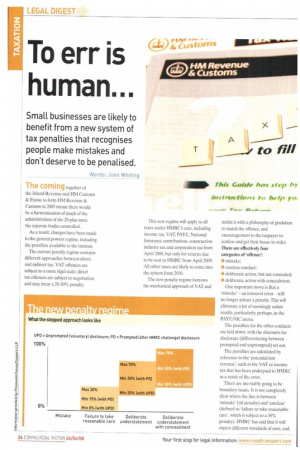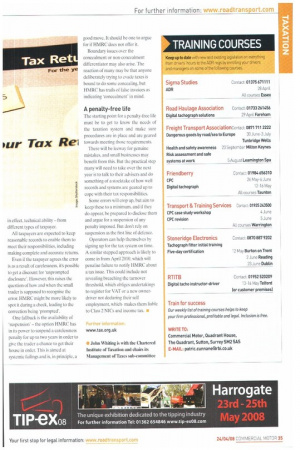P h I C tit tr
Page 34

Page 35

If you've noticed an error in this article please click here to report it so we can fix it.
To err is human...
Small businesses are likely to benefit from a new system of tax penalties that recognises people make mistakes and don't deserve to be penalised.
Words: John Whiting
The coming The coming
together of the Inland Revenue and HM Customs & Excise to form HM Revenue & Customs in 2005 meant there would be a harmonisation of much of the administration of the 20-plus taxes the separate bodies controlled.
As a result, changes have been made to the general powers regime, including the penalties available to the taxman.
The current penalty regime contains different approaches between direct and indirect tax. VAT offences are subject to a more rigid scale; direct tax offences are subject to negotiation and may incur a 20-30% penalty. This new regime will apply to all taxes under HMRC's care, including income tax, VAT, PAYE, National Insurance contributions, construction industry tax and corporation tax from April 2008, but only for returns due to be sent to HMRC from April 2009. All other taxes are likely to come into the system from 2010.
The new penalty regime borrows the mechanical approach of VAT and melds it with a philosophy of gradation to match the offence, and encouragement to the taxpayer to confess and get their house in order. There are effectively four
categories of 'offence': • mistake: • careless conduct; • deliberate action, but not concealed; • deliberate action with concealment.
One important move is that a `mistake' — an innocent error — will no longer attract a penalty. This will eliminate a lot of seemingly unfair results, particularly, perhaps. in the PAYE/NIC arena.
The penalties for the other conducts are laid down, with the discounts for disclosure (differentiating between prompted and unprompted) set out.
The penalties are calculated by reference to the `potential lost revenue', such as the VAT or income tax that has been underpaid to HMRC as a result of the error.
There are inevitably going lobe boundary issues. It is not completely clear where the line is between 'mistake' (nil penalty) and 'careless' (defined as 'failure to take reasonable care', which is subject to a 30% penalty). HMRC has said that it will expect different standards of care, and, in effect, technical ability — from different types of taxpayer.
All taxpayers are expected to keep reasonable records to enable them to meet their responsibilities, including making complete and accurate returns.
Even if the taxpayer agrees the error is as a result of carelessness, it's possible to get a discount for 'unprompted disclosure'. However, this raises the question of how and when the small trader is supposed to recognise the error. 1-11VIRC might be more likely to spot it during a check, leading to the correction being .prompted'.
One fallback is the availability of 'suspension' — the option HMRC has in its power to suspend a carelessness penalty for up to two years in order to give the trader a chance to get their house in order. This is aimed at systemic failings and is, in principle, a good move. It should be one to argue for if HMRC does not offer it.
Boundary issues over the concealment or non-concealment differentiator may also arise. The reaction of many may be that anyone deliberately trying to evade taxes is bound to do some concealing, but HMRC has trails of false invoices as indicatirny, 'concealment' in mind.
A penalty-free life The starting point for a penalty-free life must be to get to know the needs of the taxation system and make sure procedures are in place and are geared towards meeting those requirements.
There will be leeway for genuine mistakes, and small businesses may benefit from this. But the practical step many will need to take over the next year is to talk to their advisers and do something of a stocktake of how well records and systems are geared up to cope with their tax responsibilities.
Some errors will crop up, but aim to keep these to a minimum, and if they do appear, be prepared to disclose them and argue for a suspension of any penalty imposed. But don't rely on suspension as the first line of defence.
Operators can help themselves by signing up for the tax system on time. A similar stepped approach is likely to come in from April 2010. which will penalise failure to notify HMRC about a tax issue. This could include not revealing breaching the turnover threshold, which obliges undertakings to register for VAT or a new ownerdriver not declaring their self employment, whichmakes them liable to Class 2 NICs and income tax. si
Further infermatierr www.tax.org.uk
It John Whiting is with the Chartered Institute of Taxation and chairs its Management of Taxes sub-committee












































































































































































